Asus’s ROG Flow Z13, a collaboration with Acronym, has hit shelves, and I don’t even know where to begin with this one. Just take a look for yourself.
Every so often I receive one of these bizarre little computers that Asus has done in collaboration with someone or other, and my senses are ever so slightly overwhelmed. They made one with an animated exploding head on the lid. There was one that turned into a DJ deck. There was one covered in dogs.
But this latest release — the ROG Flow Z13 ACRNM — might be the wackiest one yet to cross my desk. There is no discernible theme, rhyme, or reason to it. It is pure chaos, top to bottom. Which, you know what, fine. It’s 2023. Fair enough.
The Flow Z13 is the second collaboration between ROG and ACRONYM, an apparel brand that sells pieces like this $1,800…dress, I think? It’s a 13.4-inch gaming tablet with a kickstand and detachable keyboard — a gaming Surface Pro, for lack of a better descriptor.
With a price of $2,499.99, our Core i9 13900H/RTX 4070/16GB RAM/1TB SSD/2560 x 1600 test unit targets a fairly niche audience — on-the-go gamers with deep pockets and a deeper desire to project an edgily chaotic aesthetic. Most people should not be spending this much. If it’s the convertible tablet you’re after, you can trick out a Surface Pro 9 for $500 less. If it’s gaming power and portability you’re after, a very comparable Zephyrus G14 is even cheaper. But the Z13 serves its particular, specific niche about as well as a laptop can.

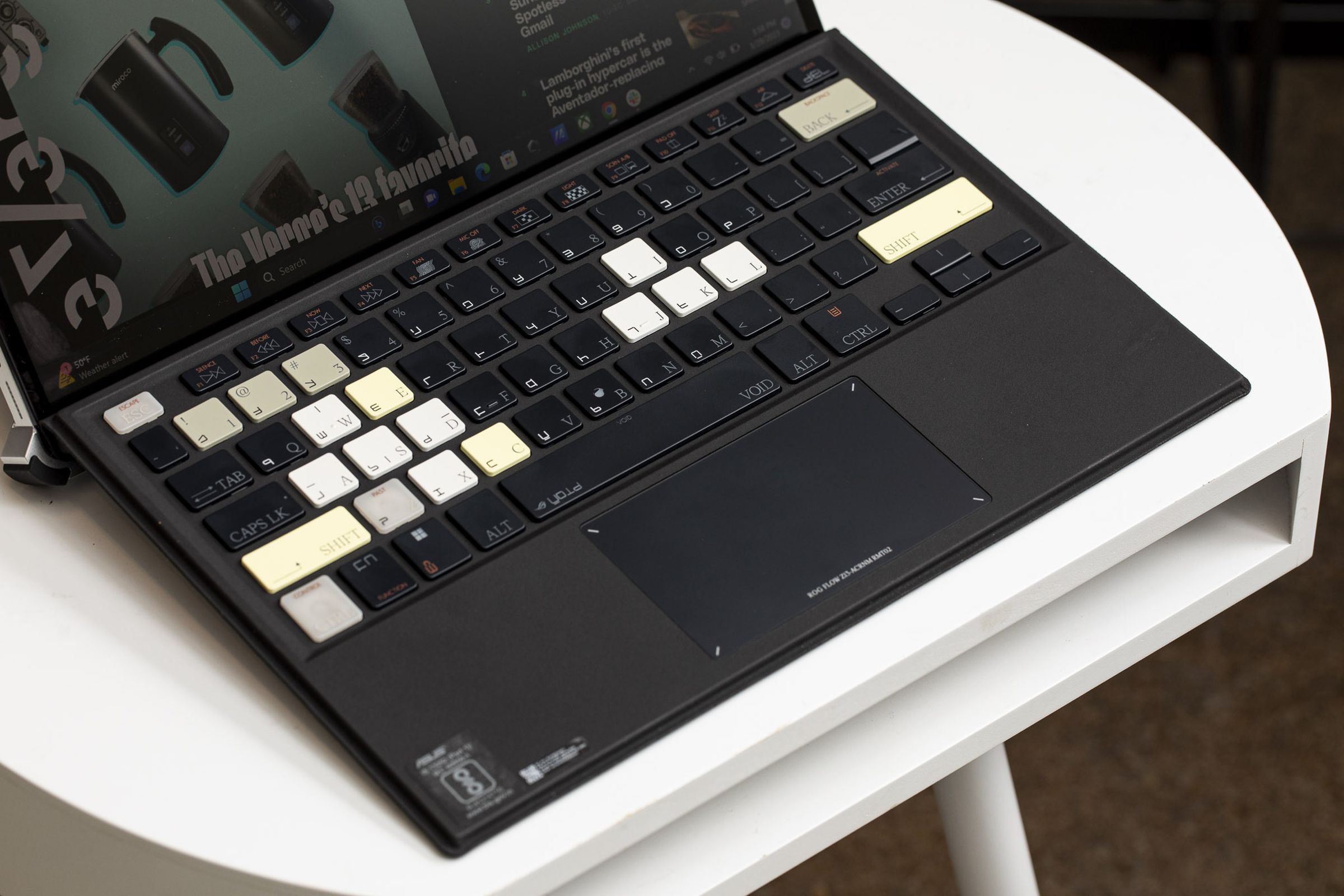
Here are some phrases that Asus uses in its press materials to sum up the aesthetic it’s going for here:
- “A redefinition of mobile computing”
- “Beautifully refined yet raw”
- “Truly unique machine”
- “A hands-free dream machine”
- “A functional yet striking work of art”
So, anyway.

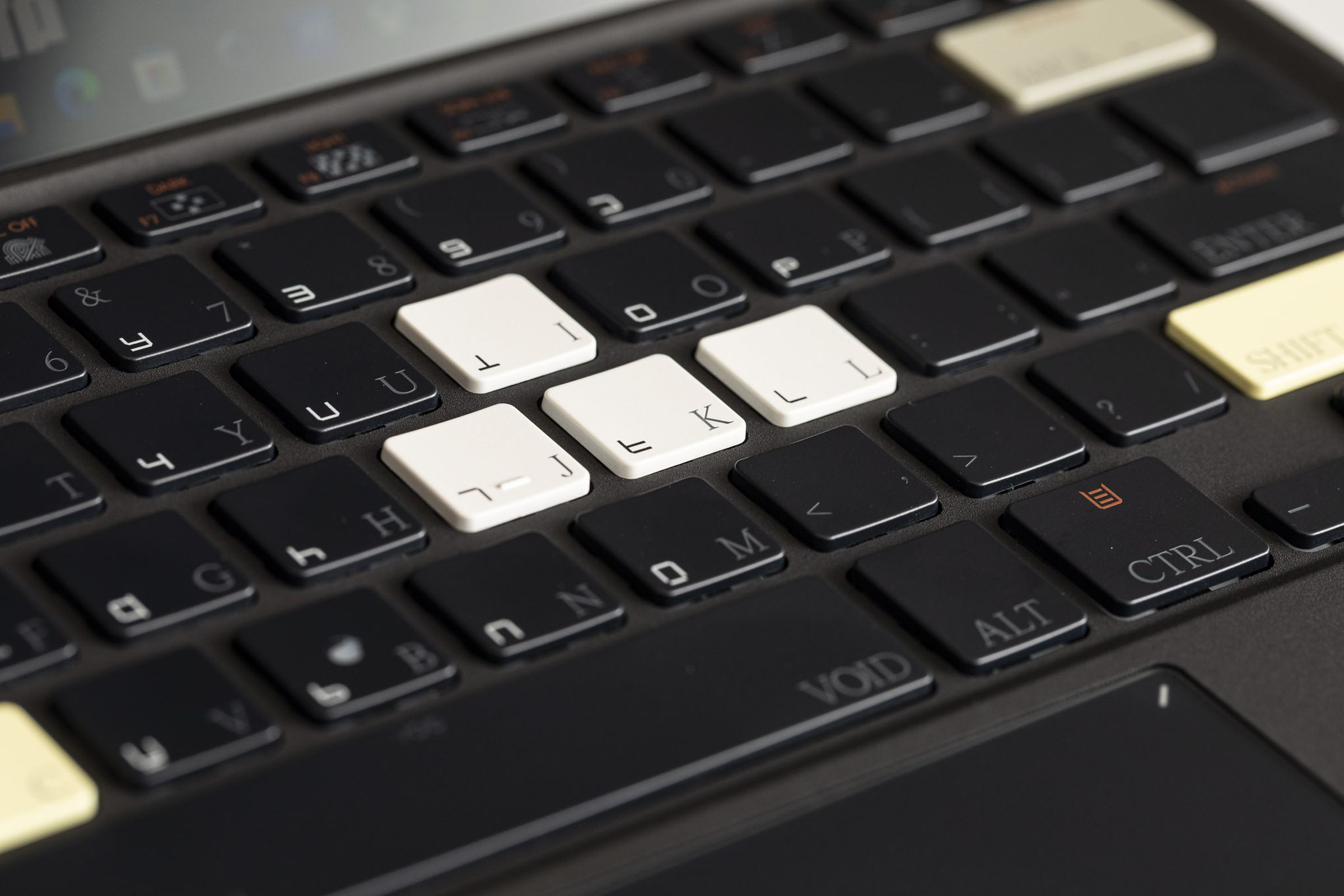
It’s avant garde, that’s for sure. Every time I look at this thing, I spot something else. The bottom is covered in logos and typography (and they’re not just stickers; they’re laser-etched into the metal). The dark leather cover sports a funky-looking shape as well. I can’t say I really know what any of them are. If any of you regularly take ayahuasca and expect that you’re aware of their deeper spiritual meaning, feel free to let me know in the comments.
The rear is dotted with rubber pads, which do look a little bit funny, but will also do a solid job of keeping the device in place if you’re trying to lie it down on a table. The corners have “drop-resistant crashworthy bumpers”. There’s also a strap that you can attach to the corners in order to sling the thing over your shoulder like a briefcase. Let’s just say I’m very glad this didn’t come out while I was in college, because I absolutely would’ve traipsed around campus with this dangling around my front like a fanny pack. The cool kids would’ve bullied me, and rightly so.

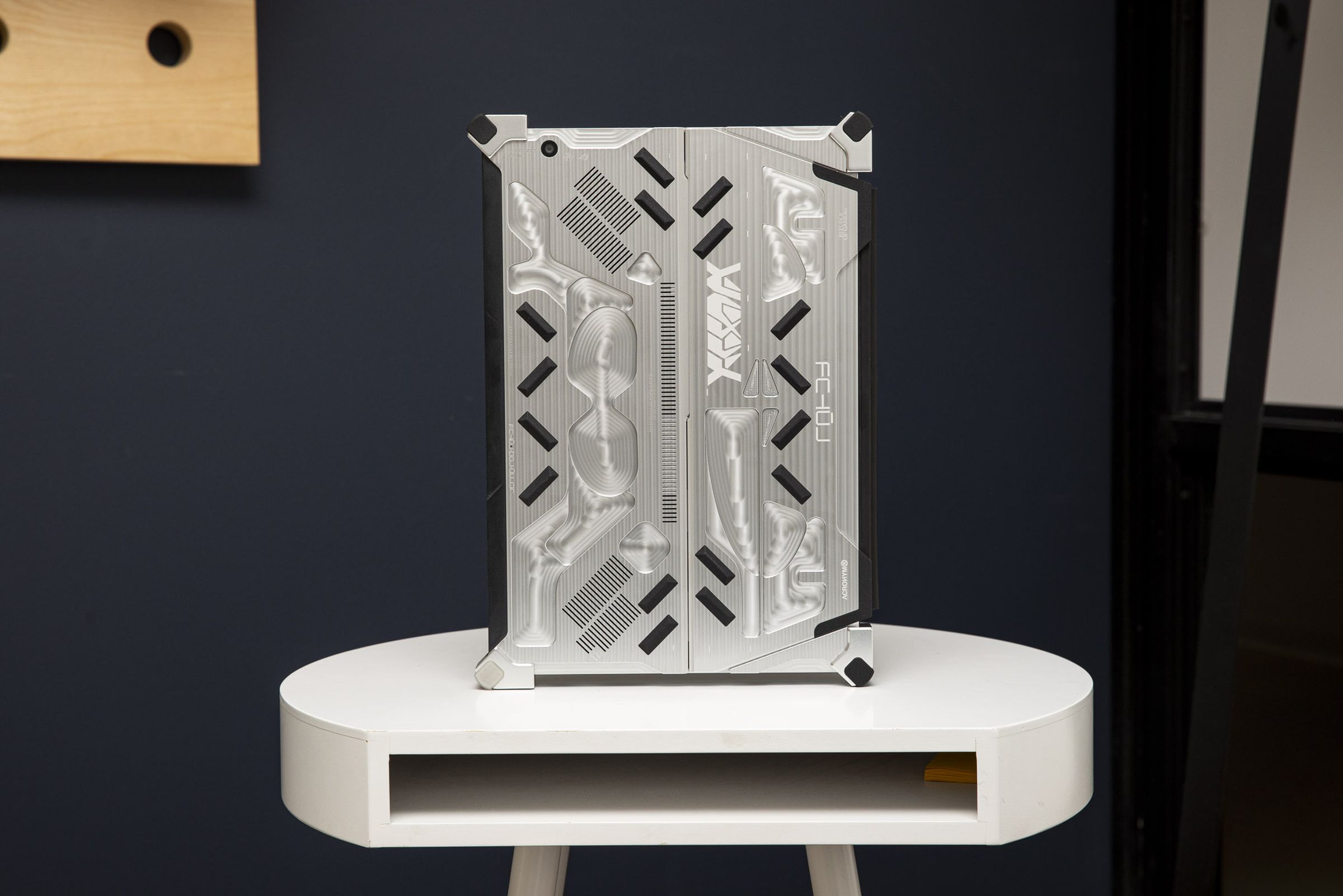

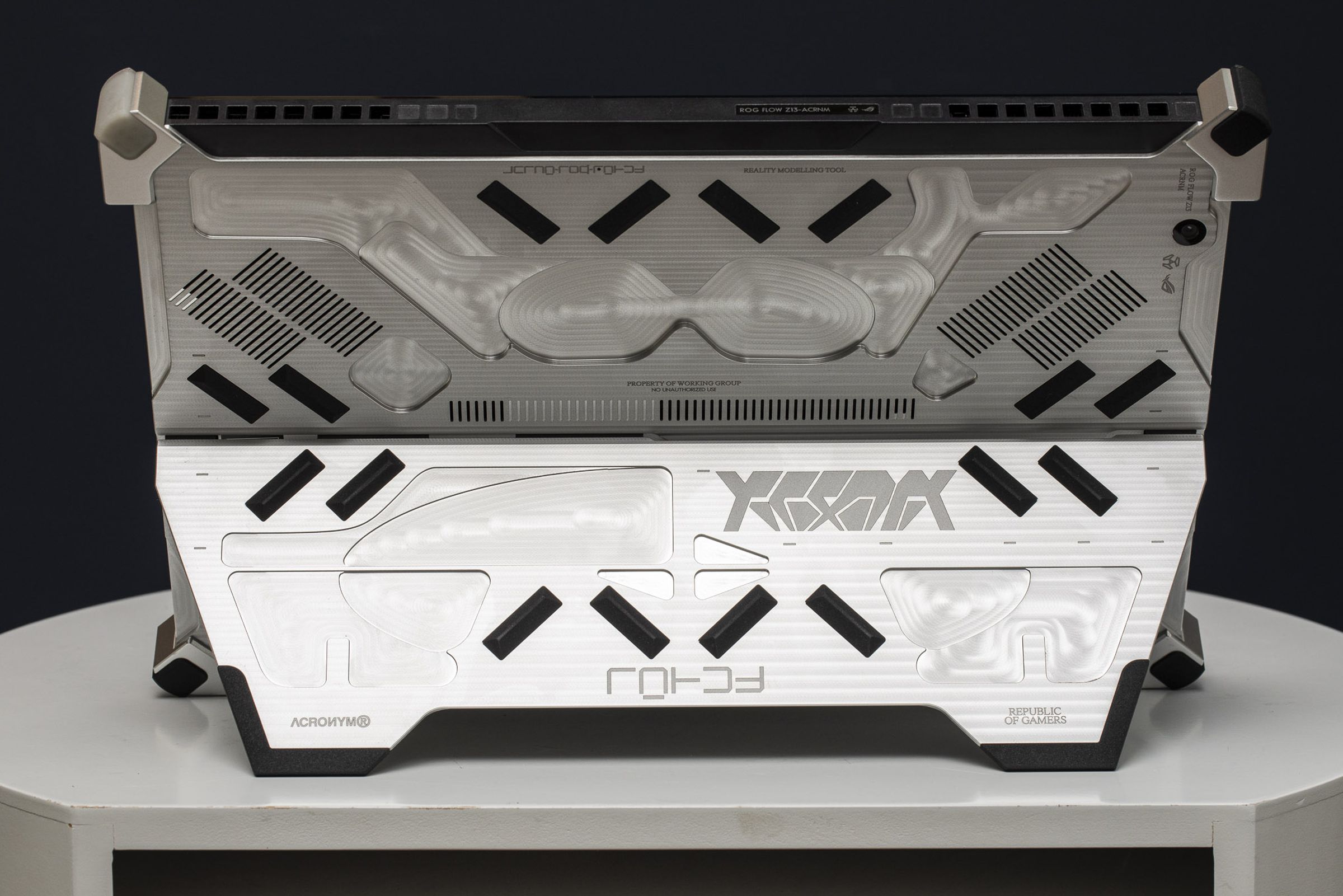
Eclectic design aside, this is a 13-inch tablet with an RTX 4070 and an H-Series Core i9 inside. That’s highly unusual — those are the types of chips you generally expect to see in much bigger gaming rigs. The keyboard is detachable; the kickstand is not. Said kickstand allows for both vertical and horizontal orientations, a feature Asus has long been convinced that people need. I have no use for a 16:10 Windows tablet in vertical orientation, but more power to you if you do.
Now, the Z13 is not particularly portable as tablets go. At 2.91 pounds and 0.61 inches thick, it’s hardly an iPad, and it’s not the type of thing I’d necessarily want to bring up for an hour-long presentation. Still, when choosing between carrying this thing in my backpack and carrying, say, a Titan GT77, I’d choose this one any day. I used this for some couch and cafe work, and could fit it onto those crowded surfaces with no problem.
One other thing to call out: the display. This model’s has a 165Hz refresh rate and 2560 x 1600 resolution. It’s quite vibrant. A number of different color modes were available for various different types of games, and I found that they improved the viewing experience. The 13.4-inch screen is a bit small for playing most games, and I had to squint at some windows here and there, but at least the QHD+ resolution delivers sharp details.
So those are the bells and whistles. Here’s what it’s like to use the thing.

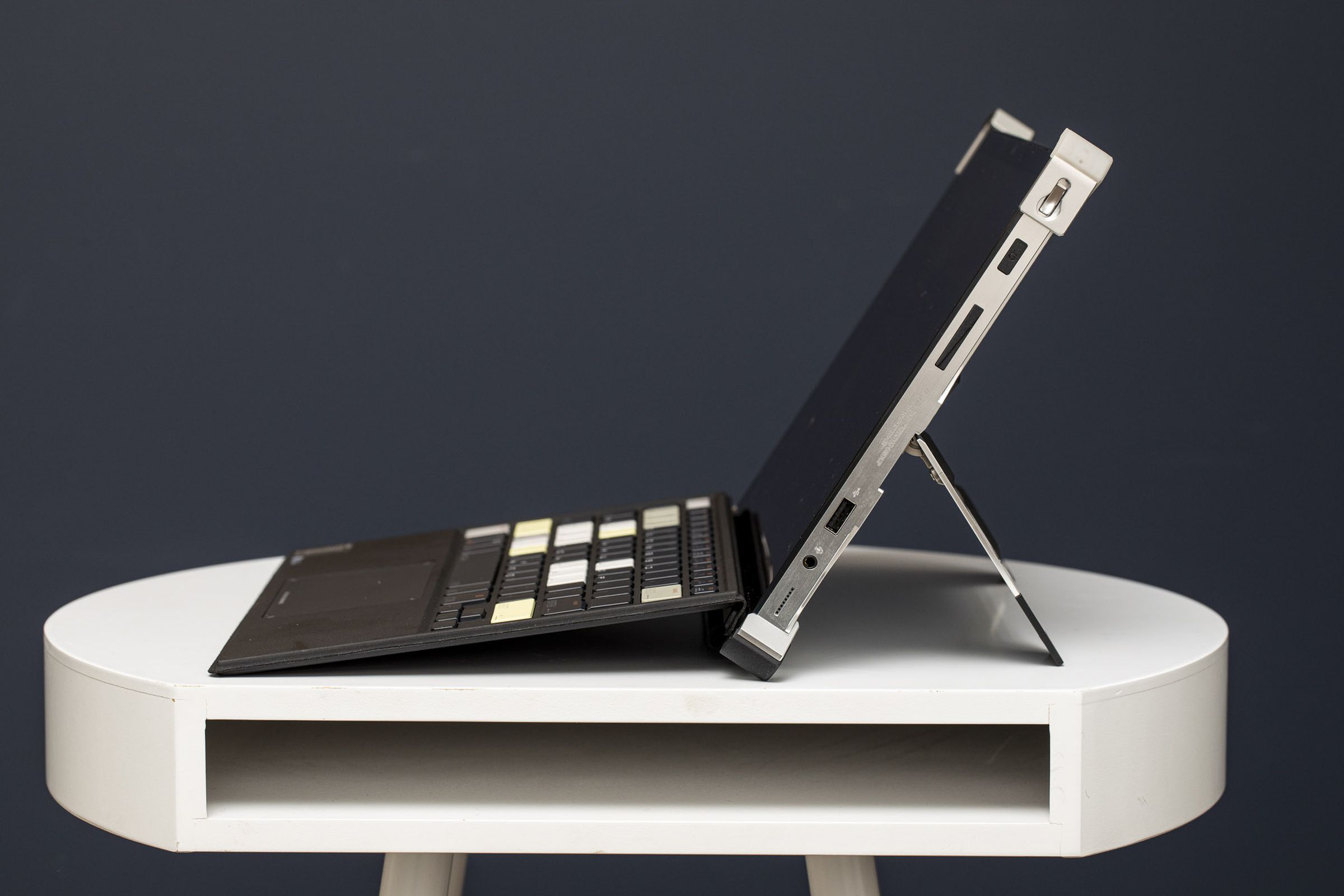
The Z13, well, you know. It’s a 13.4-inch tablet. So, bearing that in mind, the frame rates were fine.
In particular, it had no problem running demanding titles at its native QHD resolution. I saw an average of 232fps on CS:GO and 55fps on Red Dead Redemption 2, with both titles at maximum settings. Those are both better results than we saw from last year’s Zephyrus G14 (which was a full-fledged traditional gaming laptop, not one of these tablet things). They’re not stunningly good to the point where they’re blowing other premium gaming laptops out of the water, and Asus has clearly had to kneecap the (it’s fed just 65W of power — yes, it can run that low) RTX 4070 to squeeze it into this chassis. It’s a bit like having packed an entire college dorm room into the trunk of a sedan. Sure, you did it, but at what cost?
But I digress. Throughout, I was pleasantly surprised by how well the device was able to keep its temperature down. I didn’t see many spikes above 70 degrees Celsius as I played. The nice thing about this form factor, too, is that regardless how hot the chassis gets, it’s generally not going to transfer to the keyboard or palm rests and impact your gaming experience.
For an additional fee, folks can also connect the device to the XG Mobile, a line of external GPUs that should deliver significantly higher frame rates. You can currently get one of these for around $1,000.
Oh, and the Z13 supports Nvidia’s Advanced Optimus. This essentially operates your MUX switch for you automatically — it will turn the integrated GPU off when you’re gaming and turn it back on (and turn the discrete GPU off) when you’re done gaming, which saves you from having to dig through your laptop’s settings to do that manually. Nice! Fun! Love to see it.

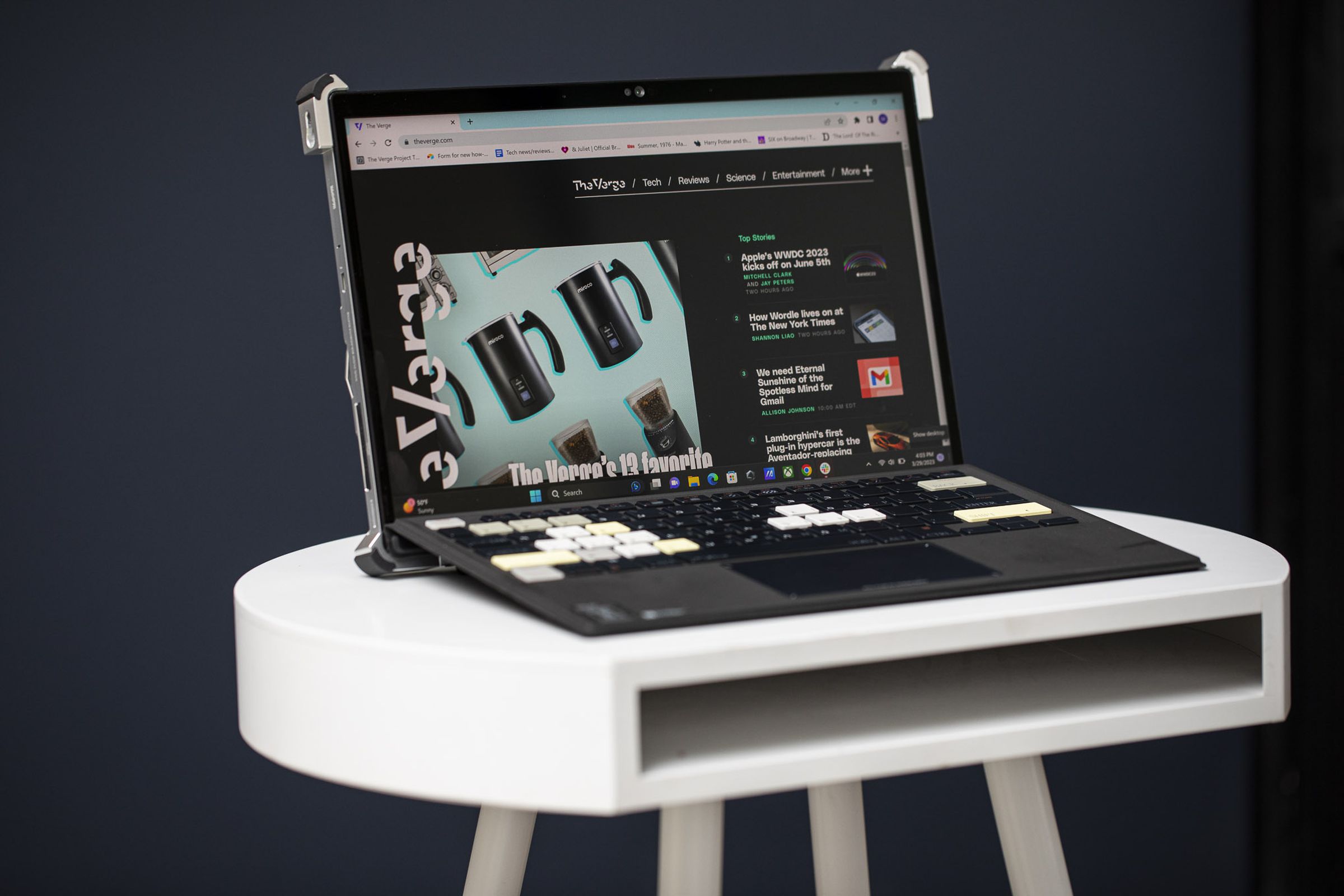
If you were expecting this device to have excellent battery life, bless your heart, but it has no such thing. I averaged four and a half hours of continuous work use, which involved bouncing around 20-ish Chrome tabs, streaming Spotify, Slacking, and such. I did get a better battery gaming result than I’d expected to, eking out about 48 minutes of Red Dead Redemption 2 play to one charge. The included 130W adapter can juice the device up to 50 percent in 30 minutes, per Asus’s estimates.
Regular readers of my reviews might expect a diatribe here about how excellent battery life should be a baseline expectation for a portable machine, but honestly, I don’t have it in me. I know that people aren’t buying this for excellent battery life or top-of-the-line frame rates; they’re buying this because it looks like it just fell down from outer space. As well they should.

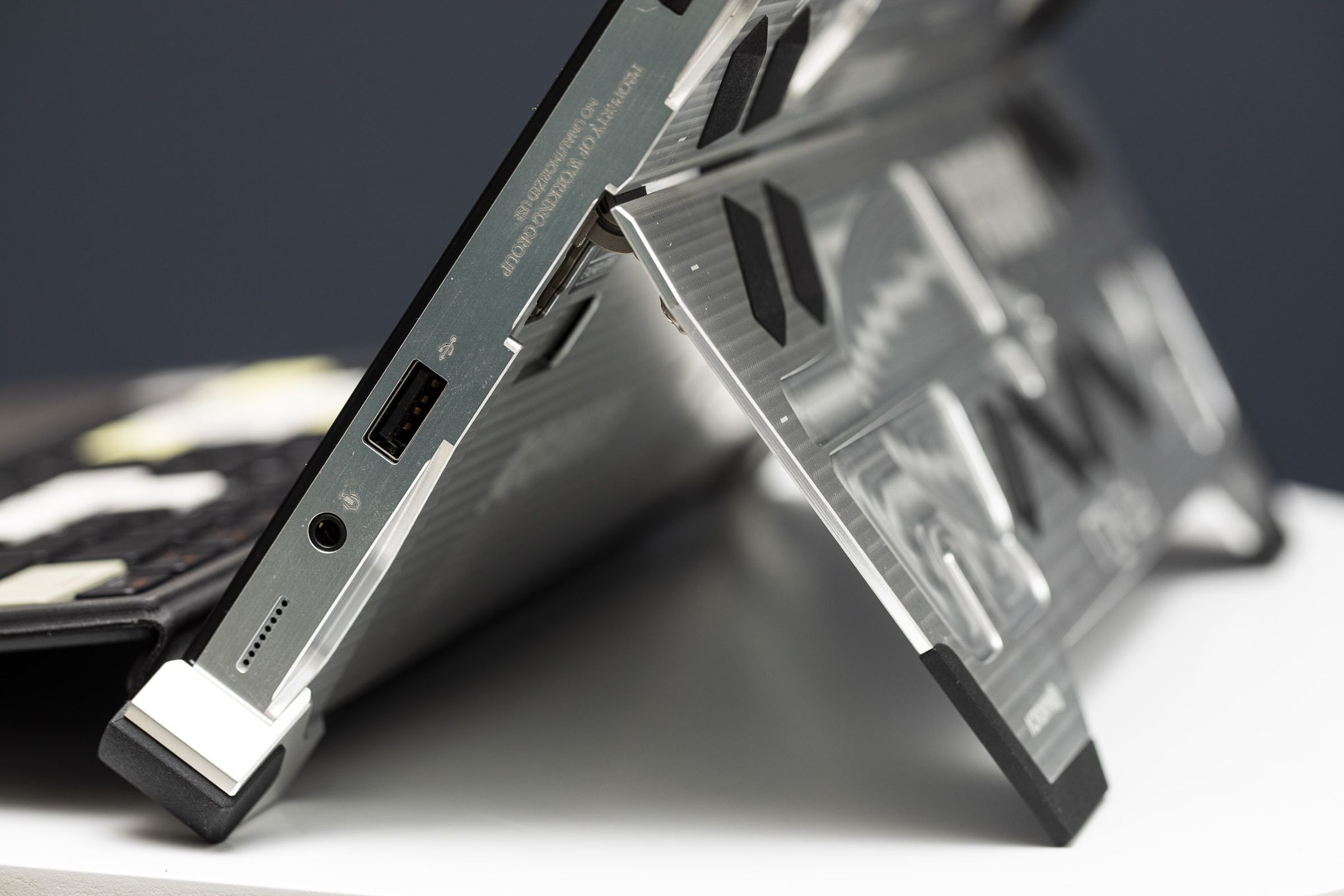
I’ve been an open-minded non-curmudgeon the whole way through this review, so I hope you’ll allow me to grump about one thing. I just can’t with the keyboard. It’s too much.
The keys contain what Asus refers to as “Acronym’s own custom alphabet”. I’m happy to learn that Acronym has an alphabet of its own. Unfortunately, it’s not the alphabet I need to type with for work.
I’m a very competent touch typist when it comes to words. But when I need to, for example, type a number on the Z13, it becomes a scavenger hunt. It’s not that the real numbers aren’t on the Z13’s keys, but they are buried in a dump of so many other symbols and colors and zany doodads that my eyes couldn’t find them instinctively. Other things just aren’t delineated. For example, the key that lowers the brightness is labeled “DARK” and has a little faint grid on it. I understand what you’re going for, Acronym, but I just want the regular brightness icon. You can jazz up the brightness icon. Just give me the brightness icon.
Wacky designs are a wonderful thing until they begin to encroach on the everyday function of a device. Kooky laptops are laptops first. The Zephyrus G14 Acronym (which I raved about upon its release) labeled its keyboard keys in a storybook-esque font that made them easier, not harder, to read. It sprinkled other decorations around the keycaps, but they were clearly and obviously delineated from the keys’ real actual labels.
Eye-popping designs are great, and this device is a unique offering you won’t find anywhere else on the market. I admire products that are unapologetically themselves, whether movies or clothing or consumer technology. But the fundamentals cannot fall by the wayside. And I hope companies, as they continue to innovate, remember that.








